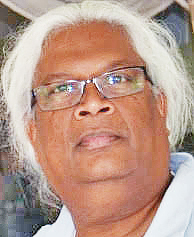Opinions
Towards US hegemony

marked European history up to 1648; Russia was not involved. Before WWII, America had eyed all independent nations as markets for its industry and sources of raw material, under its own terms, regardless of any natural rights of the reource owners. Westphalia was not an instrument that protected non-European states, though those knowing of it, could apply its principles: state sovereignty, religious freedom, basic right of political self-determination, equality and freedom from interference in national internal affairs; these guided the US declaration of independence and the UN charter. These principles were far in the future when sea-faring European marauders stumbled on pathways to the rich East, beginning in 1492. The eastern trade had been known to Mediterranean traders for over two millennia and exploited by Radhanite Jews, attracting ancient raiders, including Alexander, until repulsed by superior strength. 1492 was a great year for Iberia, as it led them serendipitously to America, a vast land with untold wealth of precious metals, which they could pillage at will, and depopulate the region by superior weapons and by killing diseases, from the common cold to tuberculosis and syphilis. At the Treaty of Tordesillas, 1494, the Spanish claimed the North Atlantic and Pacific (the “southern sea”), while the Portuguese claimed the Indian ocean, under the old Roman notion of mare clausum (closed sea), ignoring the nations that had used them for millennia, and got away with that until 1609. The claimants tried to expel all “treapassers”, more so after shipping South American wealth to Spain. Soon they confronted English, Dutch and French privateers, encouraged by their sovereigns, for a royal percentage. From 1603, the Portuguese were challenged by the others in Asia, thus beginning 300 years of conflict among themselves, and atrocities against the peoples of East Asia.
Becoming rich from Oriental spices, and Atlantic slave trade, Holland rebelled against Spain, fought for 80 years until the Treaty of Westphalia, between May and October 1648, which also ended the 30 years’ Catholic-Protestant religious war (1618-1648) in the Holy Roman empire. By its terms, Spain recognised the Dutch republic, states obtained national security and freedom of religion. But Peace ended there; Europeans trampled the world, laying waste to lands and nations in every other continent, seizing sovereignty and creating empires. In time, American colonies revolted, and adopted Westphalian doctrines of sovereignty, and repelled re-conquest. In the next century, it grew in size, strength and importance, abandoned Westphalian principles, starting with freedom and equality of peoples, and enshrined slavery in its national model. It avoided censure in destroying native American tribes, all non-Christians, joined with Christians to drive Spain from Latin America, creating sovereign nations in Central and South America, where it became supreme in influence and control, except over Mexico, which it reduced by half or more.
Since WWII, the USA has been continually at war, its major target mainland Asia, with its huge population (consumers and cheap labour) and resources. The Cold War dismantled the USSR in 1992, leaving Russia, the largest fragment, intact, today under a resolute President, far smarter than his US counterparts, and therefore a hope for that nation. But American thinking is firmly set on global domination, a unipolar world. By control of money, Rothschild backing and military power, it has conquered most smaller nations, including the ex-colonies of Europe, some through single corporations, economic blocs or trade agreements, so that small colonies with resources, constrained by ignorance, inexperience and personal cupidity (easy to bribe), are cheated in developmental stages, and get a fraction, a small fraction, of revenue, e.g. Guyana’s oil seized by Exxon (in dealings with a Guyanese trotter, when a racer was required). Guyanese Minister Trotman is at the end of a long line of salivating incompetents strung along by the practised oil pirates of America, who purchase new nations’ resources with pennies. Sovereignty to the US is humbug, hence opposition must be eliminated, by any means. That includes Syria, North Korea, Cuba, Venezuela, Russia; so who gains from the poisoning in England and Syria?
'Harden' boys discover tonka beans
 Romeo Kaseram
Romeo Kaseram
Ma said, “Don’t eat the tonka bean. It will give you short-breath!” Since we were young boys and “harden”, this much-repeated word combining into its meaning as many flavours as the off-limits tonka bean, so, it meant we were badly-behaved, our actions flagrant in the milder sense of brazen and daring, and along with this a whole lot of mischievous, in that we did outrageous things especially when we were specifically warned to not to do it. So, since we were “harden”, and had been cautioned the tonka bean would give us “short-breath”, it followed we all trooped off to see if what Ma was saying was
true, knowing a wagged forefinger accompanying her warning meant dire consequences would follow if we were disobedient. The tonka bean trees grew just behind the orange grove where we were growing up in our youthful days back home. When we were not raiding the oranges, we were harassing the iguanas perched high on the tops of the mountain Immortelles along the river’s bank. It took the longest arm among our assortment of malnutrition and stringy musculature to launch a rock, mostly with the chutzpah of youth and less with accuracy, at the hubris of the iguanas as they looked down long faces at our noisy group. Our thrown missile would rise with the best of intentions, but then splutter as it was caught among the network of branches, only to take an unpredictable downward path, its trajectory as unknown as a falling meteorite, causing us to scatter below with the alacrity of so many cockroaches at an approaching chicken.
So secure were these lizards in the lofty distance, and so inaccurate and comical our attempts to dislodge them, looking back at those many failed attempts to catch an iguana, it would have been easier to aim for the wider and more accessible target that was the moon, and if it ever happened that one among us was successful in hitting it so a piece broke off and fell down on one of the Immortelles, imagine how far and wide it would have scattered our little group of strays.
Until then, we made do with smaller pieces of the sun, prodding off from its branches with a bamboo rod many sun-ripened, golden oranges, the low-hanging immature and acidic fruit long picked off and dispatched with neutralising salt. Getting at the higher, ripened fruit had to be done with caution, since the sweetest oranges were also targeted by annoyed birds, insects, and the dreaded red-jacketed wasp that loved its sugars, respectfully addressed as Jack Spaniards.
As young boys we were already old hands at highway robbery, knowing which trees to tackle without disturbing the lethal, paper nests, and the ones to avoid where the wasps were as intolerant, irascible, and territorial as a hen guarding her chicks from a marauding mongoose. Of course, the orange trees without wasp nests were the first that had been plundered, the inhabited trees that buzzed angrily with the intensity of electric saws avoided until we had no other choice, the fruits maturing to fullness, its rind imitating the overhead sun for its inviting intensity of gold.
These “guarded” orange trees thrived as did the tonka bean trees in the distance. Until the tonka fruit began turning from green to brown, the scent of ripening wafting among the orange trees too inviting to resist: a mix of chocolate, vanilla, and brown sugar. To stand among the orange trees and its buzz of activity where birds, insects, and wasps competed with our reaching hands was to wonder why the imperative from Ma regarding staying away from such a pleasant odour meant the life and death warning from her wagging cautioning forefinger. Her warning echoed through the branches, the thorns, and leaves of the trees; we heard it as the wind soughed through the grove, its imperative unmistakeable: “You stay away! Short-breath!”
Yet our “harden” feet took us to the tonka beans. Here we discovered a repast of fallen fruits at the roots. The skin of each ripened fruit was brittle, cracking like a coat of wax to the touch; beneath this was a smorgasbord of aromas and flavours: oils of almond, the earthiness of chocolate, a sugary glimpse into heaven that is vanilla. Each tonka bean was as delicious as its smell; and we worked at the smooth outside of the rock-hard seed, until each turned as white as a sponge.
To forage among the roots of the tonka bean tree was not to look upwards; but to do so after satiation was to quickly appreciate the tolerant buzz around us had all along been growing into an angry impatience, that the sentinels of these trees, an even more virulent strain of wasps, had now mobilised, and were ready for us as interlopers.
Someone cried, “Jack Spaniards! Run!”, and having sounded the alarm, took off as from a slingshot. We followed swiftly, the devil takes the hindmost, until winded, we stopped to catch our breaths, Ma’s words pounding in our ears between gasps: “Don’t eat the tonka bean! You will get short-breath!”
